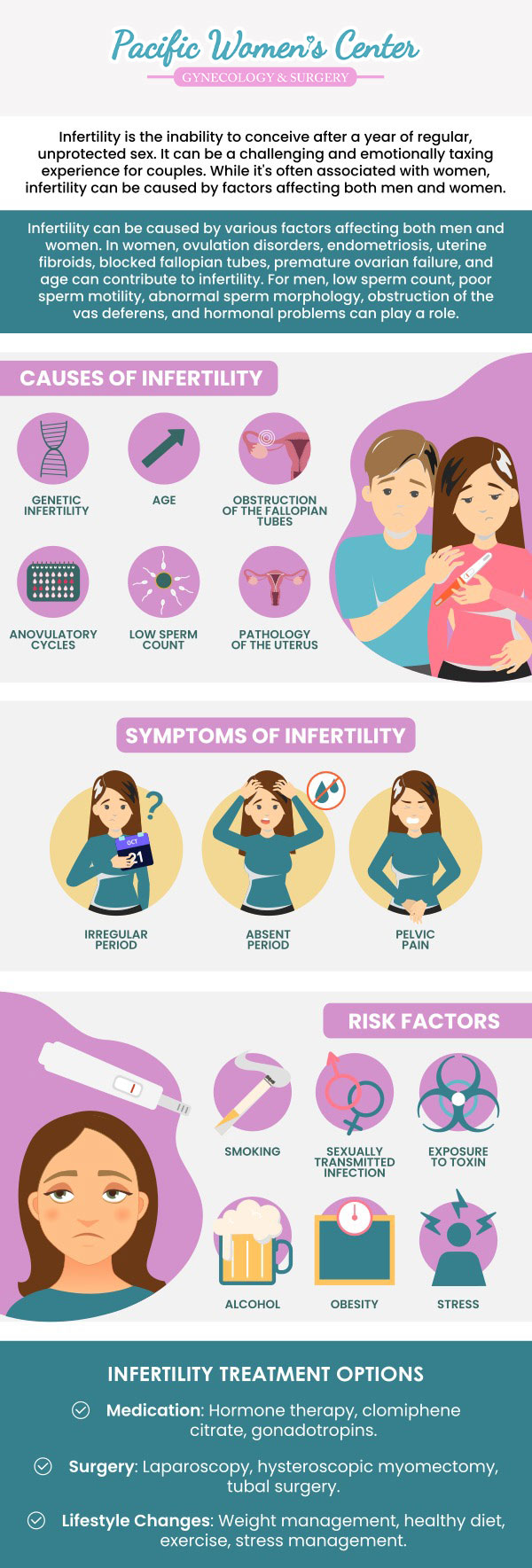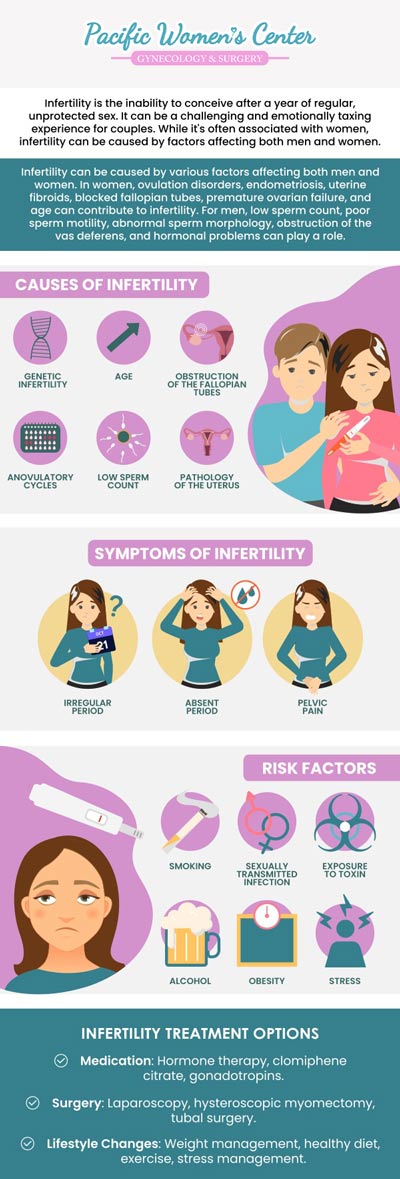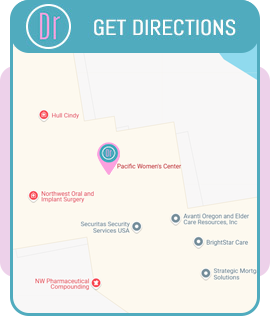Infertility Treatment Clinic in Eugene, OR
Infertility treatment includes a range of medical procedures used to assist individuals or couples in becoming pregnant. Options include medications to stimulate ovulation, in vitro fertilization (IVF), intrauterine insemination (IUI), or surgery for underlying reproductive issues. The choice of treatment depends on the cause of infertility, age, and overall health. Dr. Richard Beyerlein MD, CPI, FACOG, and Tamara A. Stenshoel, MD, FACOG can assist in choosing the optimal course of action depending on your requirements. For more information, please contact us or book an appointment online. We are conveniently located at 911 Country Club Rd. Suite 222, Eugene, OR 97401.




Table of Contents:
How is infertility treated?
What are the potential causes of infertility?
What are the different types of fertility treatments?
What are signs of infertility in females?
When you are trying to get pregnant, there is a lot of uncertainty, and infertility can amplify that feeling. At Pacific Women’s Center, we empathize with the uncertainty our patients feel surrounding infertility concerns, but we also want you to know that there are proven ways to increase your fertility. If you are dealing with infertility, we would be more than happy to provide you with infertility treatment.
The initial step with infertility treatment is to identify and isolate the cause. Once the cause of infertility is identified, your OBGYN or another medical professional can move forward with establishing a treatment plan. Depending on the cause, infertility treatment can be as simple as changing prescriptions to a medication that does not have fertility complications as a side effect, or it could require such treatments as hormone therapy, fertility medications, surgery, or assisted reproduction treatments.
There are a variety of potential causes of infertility, including various medical conditions, scarring, and medications. The following are some examples of common causes of infertility:
● Certain medications
● Cervical mucus problems
● Chemotherapy
● Endometriosis
● Fibroids
● Hyperthyroidism or hypothyroidism
● Pelvic inflammatory disease (PID)
● Premature ovarian failure
● Scarring from cervical or pelvic surgery
While there are several different infertility treatments, the most common treatment of infertility is fertility drugs. With that in mind, there are also several different types of fertility drugs. In general, fertility drugs work by increasing or decreasing hormone production to trigger ovulation. Some examples of commonly used fertility drugs include the following (examples of commercial brand names are in parentheses):
● Aromatase inhibitors, such as letrozole (Femara), which stimulates ovulation by causing the pituitary gland to release more follicle-stimulating hormones (FSH) and luteinizing hormones (LH)
● Dopamine agonists, such as bromocriptine (Cycloset), which is used when ovulation problems are caused by excessive production of prolactin by the pituitary gland.
● Gonadotropins, including human menopausal gonadotropin (Menopur), human chorionic gonadotropins (Ovidrel), and FSH (Follitropin AQ)
● Metformin, for infertility complications arising from insulin resistance, often caused by polycystic ovarian syndrome (PCOS)
All of the fertility and hormone medications listed above have been approved for safe and effective use by the Food and Drug Administration (FDA).
Other types of infertility treatment include in vitro fertilization (IVF), intrauterine insemination (IUI), laparoscopic or hysteroscopic surgery to remove or correct abnormalities contributing to infertility, or tubal surgeries if fallopian tubes are blocked or filled with liquid. In general, surgery is not a first-line treatment, which is why fertility medication and hormone therapy are more common.
While the most common sign of infertility in females is an inability to get pregnant, there are several other signs of infertility. With that being said, a sign of infertility does not mean you are infertile, but it could indicate something to speak to your OBGYN or primary care physician about. Some of the possible signs of infertility include the following:
● Dark or pale menstrual blood
● Heavy, irregular, long (more than 35 days), painful, or short (less than 21 days) menstrual cycles
● Hormonal fluctuations, which could involve unexplained weight gain, severe acne, reduced sex drive, or nipple discharge
● Pain during sex, known medically as dyspareunia, which could be a sign of endometriosis or fibroids
It should be noted that many women who experience the above do not have infertility. That being said, if you are concerned about infertility and currently dealing with any of the above concerns, we would be happy to meet with you at Pacific Women’s Center. For more information, please contact us or book an appointment online. We are conveniently located at 911 Country Club Rd. Suite 222, Eugene, OR 97401. We serve patients from Eugene OR, Springfield OR, Coburg OR, Creswell OR, Cottage Grove OR, Lowell OR, Junction City OR, and surrounding areas.

ADDITIONAL SERVICES YOU MAY NEED
❱ Abdominal Hysterectomy
❱ Bladder Lift Surgeon Q&A
❱ Cervical Cone Biopsy
❱ Colposcopy
❱ Endometrial Ablation
❱ Endometrial Biopsy
❱ Female Sexual Dysfunction
❱ Gynecological Surgery
❱ Gynecology
❱ Hormone Therapy
❱ Vaginal Hysterectomy
❱ Endometriosis Diagnosis & Care



